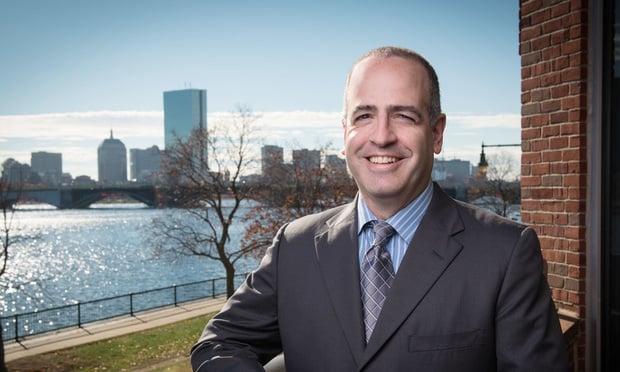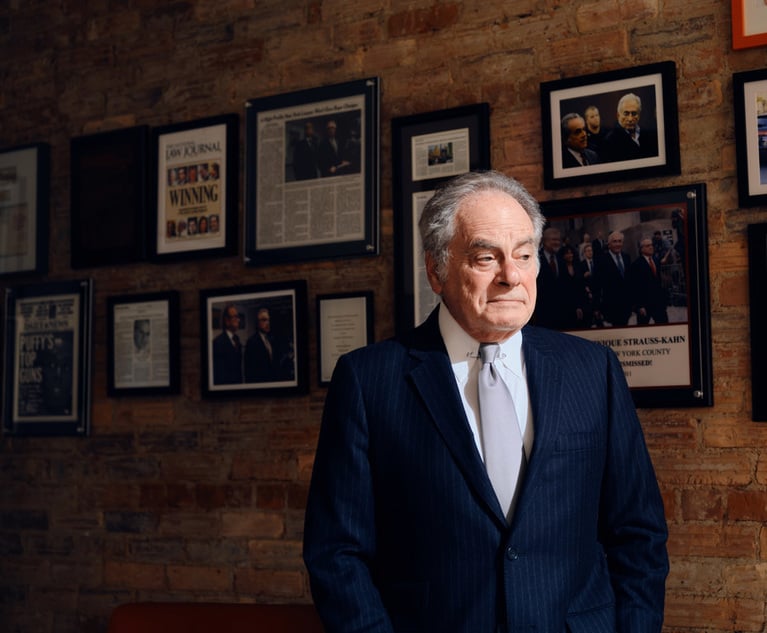Litigator of the Week: Roaring Back From the Largest-Ever Patent Verdict
In late 2016, Gilead Sciences Inc. and a Fish & Richardson trial team led by Jonathan Singer were hit with a $2.5 billion jury verdict, the largest ever recorded in a U.S. patent infringement case. Here's how they turned the tables on Merck.
February 22, 2018 at 07:33 PM
5 minute read
The original version of this story was published on Litigation Daily

It takes a strong stomach to be a litigator. It's the nature of hard-fought cases that the biggest wins sometimes come after devastating losses. Experienced trial lawyers know the fight's not over till it's over. They learn to keep their cool.
Just ask Jonathan Singer.
In late 2016, Gilead Sciences Inc. and a Fish & Richardson trial team led by Singer were hit with the largest verdict ever recorded in a U.S. patent infringement case.
“It was a gut punch, for sure,” Singer, a principal in the firm's San Diego office, said of the jury verdict, which handed Merck & Co. $2.54 billion in damages for willful infringement on its patent for a groundbreaking hepatitis C treatment.
In the months that followed, Gilead assembled a three-firm team of attorneys with the sole objective of eradicating the ruling in the gauntlet of post-trial motions and, if necessary, an appeal to the U.S. Court of Appeals for the Federal Circuit.
The multi-pronged approach paid off in dramatic fashion this past week when U.S. District Judge Leonard P. Stark of the District of Delaware granted Gilead's request for judgment as a matter of law and invalidated Merck's patent for lack of enablement, an aspect of U.S. patent law that requires that patents disclose how to make a treatment without undue experimentation.
(The case was originally brought by Idenix Pharmaceuticals and collaborator Universita di Cagliari of Italy. Shortly after the suit was filed, Merck acquired Idenix and the rights to its uprifosbuvir HCV medication.)
Singer, who tried the case in Delaware federal court, defended his decision nearly two years earlier not to include enablement in Gilead's attempt to extinguish the blockbuster case on a motion for summary judgment. Rather, he and fellow Fish & Richardson partners Douglas McCann and Joseph Warden had unsuccessfully argued that the co-called '597 patent was invalid for lack of written description.
“We chose that because the way the patent was written, it was the simpler argument. It wasn't necessarily the strongest,” Singer explained.
“Since you only get one shot, you've got to make the cleanest argument you can.”
But Singer said his team did make enablement an important focus of the 10-day trial, where he pressed Merck's expert witness on the specificity of the patent's claims. Jurors ultimately rejected the defense, but by that time, the trial record contained the evidence that would be the foundation for post-trial motions.
Following the verdict, which carried the threat of treble damages, Gilead then expanded its team to include attorneys from Irell & Manella and Orrick, Herrington & Sutcliffe's appellate unit. Irell, led by Jason Sheasby, partnered with Singer and the Fish & Richardson team to split the post-trial briefing and help prepare the JMOL motion.
Meanwhile, Gilead's in-house lawyers, Lorie Ann Morgan, Patricia Thayer and Andrea Hutchison, were “essential” in coordinating the campaign and helping to choose the best arguments, Singer said.
“This was a first for me, this many firms,” he said. “An unusual verdict creates unusual circumstances.”
Meanwhile Merck was represented by lawyers with Ashby & Geddes and Jones Day.
Gilead's fortune started to turn last September, when Stark declined to impose enhanced damages in the case.
The jury's finding of willful infringement had exposed Gilead to the possibility of treble damages. Idenix itself had asked Stark to “at least double” the award to more than $5 billion.
In his ruling, Stark indicated that he wasn't entirely convinced by the verdict, saying that “nearly every aspect of this case was 'close' in the sense that it easily could have gone the other way.” Stark at the time withheld a ruling on Gilead's motions for JMOL and a new trial.
On Feb. 16, however, Stark finally returned his ruling in favor of Gilead. In a 50-page memorandum opinion, he said the scope of the patent's claims included “many thousands,” if not billions, of compounds, which would have required “extensive” experimentation in order to synthesize the patented compound. And given the “novelty and infancy” of the field in the early 2000s, it would be impossible for a person of ordinary skill to conceive of all the embodiments of the claims.
“Hence, a reasonable fact-finder could only reach one conclusion: that the range of potential candidates is and was substantial, and that testing played an indispensable and exploratory—rather than confirmatory—role in a [person of average skill's] attempts to practice the patent's claims,” he wrote.
In a statement, Orrick partner Joshua Rosenkranz praised the ruling and the “extraordinary legal team that generated this result.”
“I'm particularly proud to be affiliated with Gilead, which never wavered in the face of extraordinary pressure, and whose in-house lawyers were integrally involved at every step,” he said. “We look forward to working with the same team to defend this win on appeal.”
For Singer, the ruling was a testament to teamwork and vindication for a client that had achieved life-saving innovation that has helped to treat millions of patients suffering from hepatitis C.
“Gilead should be awfully proud,” he said. “They wanted to discover what everybody was after, and they found it.
This content has been archived. It is available through our partners, LexisNexis® and Bloomberg Law.
To view this content, please continue to their sites.
Not a Lexis Subscriber?
Subscribe Now
Not a Bloomberg Law Subscriber?
Subscribe Now
NOT FOR REPRINT
© 2025 ALM Global, LLC, All Rights Reserved. Request academic re-use from www.copyright.com. All other uses, submit a request to [email protected]. For more information visit Asset & Logo Licensing.
You Might Like
View All
A Lesson on the Value of Good Neighbors Amid the Tragedy of the LA Fires

Working Across the 'Entire Ecosystem' Propels Ropes & Gray's Life Sciences Practice

For Paul Weiss, Progress Means 'Embracing the Uncomfortable Reality'
5 minute read
Ben Brafman Reflects on Nearly 50 Years as a Defense Attorney
Trending Stories
Who Got The Work
J. Brugh Lower of Gibbons has entered an appearance for industrial equipment supplier Devco Corporation in a pending trademark infringement lawsuit. The suit, accusing the defendant of selling knock-off Graco products, was filed Dec. 18 in New Jersey District Court by Rivkin Radler on behalf of Graco Inc. and Graco Minnesota. The case, assigned to U.S. District Judge Zahid N. Quraishi, is 3:24-cv-11294, Graco Inc. et al v. Devco Corporation.
Who Got The Work
Rebecca Maller-Stein and Kent A. Yalowitz of Arnold & Porter Kaye Scholer have entered their appearances for Hanaco Venture Capital and its executives, Lior Prosor and David Frankel, in a pending securities lawsuit. The action, filed on Dec. 24 in New York Southern District Court by Zell, Aron & Co. on behalf of Goldeneye Advisors, accuses the defendants of negligently and fraudulently managing the plaintiff's $1 million investment. The case, assigned to U.S. District Judge Vernon S. Broderick, is 1:24-cv-09918, Goldeneye Advisors, LLC v. Hanaco Venture Capital, Ltd. et al.
Who Got The Work
Attorneys from A&O Shearman has stepped in as defense counsel for Toronto-Dominion Bank and other defendants in a pending securities class action. The suit, filed Dec. 11 in New York Southern District Court by Bleichmar Fonti & Auld, accuses the defendants of concealing the bank's 'pervasive' deficiencies in regards to its compliance with the Bank Secrecy Act and the quality of its anti-money laundering controls. The case, assigned to U.S. District Judge Arun Subramanian, is 1:24-cv-09445, Gonzalez v. The Toronto-Dominion Bank et al.
Who Got The Work
Crown Castle International, a Pennsylvania company providing shared communications infrastructure, has turned to Luke D. Wolf of Gordon Rees Scully Mansukhani to fend off a pending breach-of-contract lawsuit. The court action, filed Nov. 25 in Michigan Eastern District Court by Hooper Hathaway PC on behalf of The Town Residences LLC, accuses Crown Castle of failing to transfer approximately $30,000 in utility payments from T-Mobile in breach of a roof-top lease and assignment agreement. The case, assigned to U.S. District Judge Susan K. Declercq, is 2:24-cv-13131, The Town Residences LLC v. T-Mobile US, Inc. et al.
Who Got The Work
Wilfred P. Coronato and Daniel M. Schwartz of McCarter & English have stepped in as defense counsel to Electrolux Home Products Inc. in a pending product liability lawsuit. The court action, filed Nov. 26 in New York Eastern District Court by Poulos Lopiccolo PC and Nagel Rice LLP on behalf of David Stern, alleges that the defendant's refrigerators’ drawers and shelving repeatedly break and fall apart within months after purchase. The case, assigned to U.S. District Judge Joan M. Azrack, is 2:24-cv-08204, Stern v. Electrolux Home Products, Inc.
Featured Firms
Law Offices of Gary Martin Hays & Associates, P.C.
(470) 294-1674
Law Offices of Mark E. Salomone
(857) 444-6468
Smith & Hassler
(713) 739-1250








